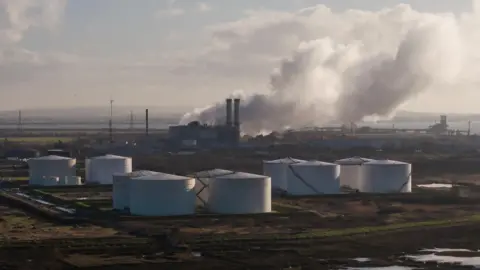**British Gas Owner Acquires Major LNG Terminal for £1.66 Billion**
In a significant development for the UK energy landscape, National Grid has reached an agreement to sell its prominent Grain LNG terminal for £1.66 billion. The deal is a collaborative effort between Centrica, the parent company of British Gas, and Energy Capital Partners (ECP). This transaction emphasizes a strategic shift in the energy sector amid a backdrop of rising energy demands and an urgent need for stable supply chains.
The sale is contingent on receiving the necessary regulatory and governmental approvals before it can be finalized, with a target completion date set for the end of the current year. Grain LNG is recognized as the largest facility in the UK dedicated to receiving liquefied natural gas (LNG), a form of natural gas that has been cooled into a liquid state for easier transport and storage. Located on the Isle of Grain in Kent, this facility plays a crucial role in ensuring the stability of the UK’s gas supply, acting as a significant hub in the nation’s energy infrastructure.
John Pettigrew, the Chief Executive Officer of National Grid, articulated that this sale aligns with the company’s broader strategy to concentrate more heavily on electricity and gas networks. Earlier in the year, National Grid also divested its renewable energy division, NG Renewables, marking a clear transition towards focusing primarily on the infrastructure that supports the transport of energy rather than production. Pettigrew noted, “This deal marks another successful step in delivering National Grid’s previously communicated strategy to streamline our business and focus on networks,” highlighting the company’s evolving objectives.
On the other side of the transaction, the acquisition of Grain LNG represents an important addition to Centrica’s existing infrastructure portfolio, which includes the Rough gas storage facility, noted as the UK’s largest gas storage site. This strategic acquisition provides Centrica with greater control over gas supplies, an essential advantage in mitigating potential global price fluctuations—a concern that has escalated in recent years, particularly following geopolitical events such as Russia’s invasion of Ukraine.
Centrica’s Chief Executive, Chris O’Shea, emphasized the significance of Grain LNG, describing it as “a key strategic asset for the UK” and integral to the nation’s energy security. In an interview with BBC Radio 4’s Today programme, he stressed the importance of ensuring that customers receive the energy they need at reasonable prices, stating, “Having very stable import facilities to ensure we’ve got that energy will help to keep consumer prices in the right place.”
ECP, a firm specializing in investments in energy-related projects that support a transition towards cleaner energy, expressed confidence in the future role of Grain LNG. Tyler Reeder, ECP’s president and managing partner, contended that the facility will be increasingly relied upon for dependable energy delivery to local markets, aligning with the UK government’s ambitious objectives for expanding green energy infrastructure aiming for a clean power system by 2030.
Moreover, the UK government is focused on advancing renewable energy sources, particularly solar and wind, pushing for a significant increase in cleaner energy options as part of its strategy for a sustainable future. This acquisition reinforces the ongoing transformation within the UK energy landscape, highlighting the balancing act between deploying renewable resources and ensuring energy security through established infrastructure like Grain LNG.
In summary, the sale of the Grain LNG terminal marks a pivotal moment for both National Grid and Centrica, demonstrating a proactive approach to addressing current and future energy demands in the UK while navigating global market dynamics. The completion of this transaction, pending regulatory approvals, could have widespread implications for the country’s energy strategy going forward, as it endeavors to strengthen its resilience in an ever-evolving market.












